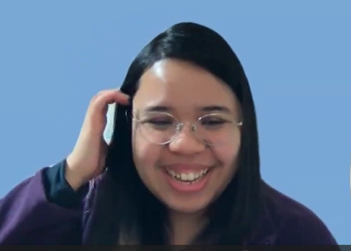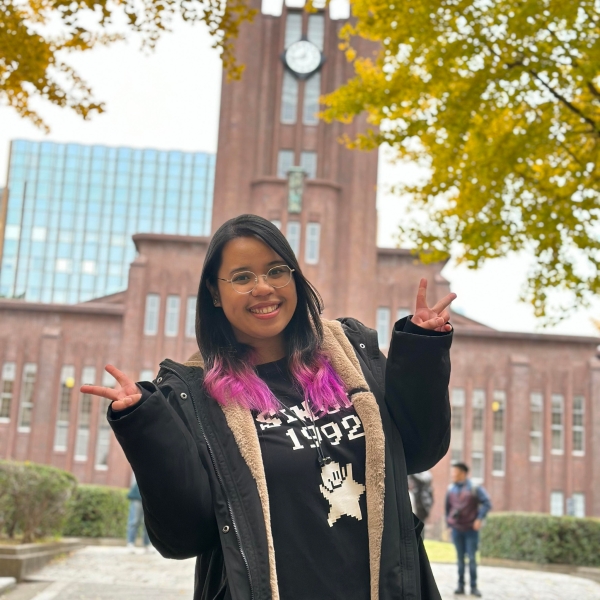Interview Series - Insights from Students -
- Name
- Bea LEE
- Nationality
- Philippines
- School at UTokyo
- Graduate School of Interdisciplinary Information Studies
- Academic Status
- Graduate Student : Doctoral Program
- Date of enrollment UTokyo
- 2019.4- Research Students, 2020.9- Master Program, 2022.9- Doctoral Program
- The language used for the interview
- Japanese

First visit to Japan during study abroad
Tell us about your decision to study at the University of Tokyo.
I developed an interest in Japanese anime at around 10 years old and in Japanese idols when I was in high school. During my university years, I took Japanese language classes for two years. An older student who had previously studied in the same program as me at the University of Tokyo reassured me, saying, “Since the program is conducted in English, you can manage without any fluency in Japanese.” Encouraged by this advice, I decided to pursue my studies in Japan. Despite my fondness for Japan since childhood, this study abroad opportunity marked my first visit to Japan.
The enjoyment and challenges of using foreign languages
How did you cope with things after coming to Japan?
I managed somehow at the airport. However, from the first day, I was constantly reminded of my lack of understanding of the Japanese language. Despite studying Japanese for two years in my home country, I was shy at the time, and the only phrase I could say was “Itadakimasu.” Starting from the day after my arrival in Japan, a tutor accompanied me for procedures at places like the ward office and the bank. But when opening a bank account, I was told to write my name in katakana, and it was a challenging experience. At that time, my writing level was such that I was able to write only if I concentrated hard. When I finally wrote my name in katakana as ベヤ (Beya), I was told that the ヤ (ya) looked like カ (ka), and I had to rewrite it on a new form. It was a difficult period, getting through each experience at convenience stores and everywhere else step by step.
It was in 2019, wasn’t it? You took Intensive Japanese Course, Class 2 (upper elementary level) and Class 3 (lower intermediate level), in two consecutive terms that year. After that, you didn’t take any Japanese language courses. Sometimes when you came to work at the center, we had chances to meet and talk. However, talking to you again for the first time in a while, I’m surprised to see that your Japanese has improved even more. What have you been doing in these past four years to enhance your Japanese skills?
I also participated in the Language Exchange Program within the University of Tokyo. Additionally, as I used language exchange apps on my smartphone where other learners and I corrected each other’s writing and asked questions, I ended up meeting some of those people in person and could make acquaintances.
Furthermore, I work part-time speaking English with students studying at external educational institutions. When conversing with someone not proficient in English, it often leads to speaking in Japanese, surprisingly making the experience enjoyable. Since the students are all quite young, I naturally take on a role similar to that of an older sister.
In addition, I use several books for my studies. For instance, there’s a “Word Search Puzzle” book. Even when I ask others to teach me new words while conversing, they probably don’t know what words I’m unfamiliar with, so those kinds of new words don’t come up. Therefore, I thought using the word search book for studying would be beneficial.
I’m also using another book, a collection of short stories. Since puzzles alone don’t form coherent sentences and lack context, I chose to read stories at my level to gain a better understanding.

So you’ve been making various efforts. Incredible!
Thank you. Also, I have had the experience of dating a Japanese person, which significantly contributed to improving my Japanese. We’ve already broken up, though.
Maybe we shouldn’t delve too much into that (laughs).
No, it’s okay. It’s already in the past (laughs).
There were good things, too. During disagreements, we both made an effort to understand each other. Since I’m not a native speaker, I often thought, “Is this phrase correct?” or “Does it mean this?” while conversing. Also, I would be mindful of whether I understood what he meant when he talked to me. In other words, when we talked and there was some small thing I couldn’t understand, I could usually fill in the gaps using contextual clues. Whenever we had deep talks, we would be mindful of whether we truly understood what the other person meant to say.
However, in the end, it became one of the reasons for our breakup. He said, “Because you’re good at Japanese, I expect you to understand me better,” but what I wanted to say was, “Language and culture are entirely different” and “Just because I can speak Japanese doesn’t mean I truly understand Japanese culture or the way Japanese people think.” However, on his end, he was like, “But you’re really good at Japanese, aren’t you? (So that should be enough.)” So that’s how it ended.
So that’s how it was.
Aspiring to build local connections: creating local friends
What motivates you to learn Japanese? As motivation for learning Japanese, which is greater: curiosity or necessity?
For now, in terms of motivation to learn Japanese, I believe curiosity is still the most significant. As for necessity, currently, I am in a situation where I hardly face any difficulties related to Japanese. I can ask someone if I don’t understand something, and I can generally comprehend the responses. Even if I don’t understand, I can ask again.
Has your motivation changed over the past five years?
Yes, initially, it was out of necessity—for survival. But now that I’ve adapted, I have a desire to make friends.
Also, I’ve noticed that most of my friends who are fellow international students eventually return to their home countries or move elsewhere. That makes me a bit lonely, so I want to make more local friends who are living here. For example, I still keep in touch with L-san from Intensive Japanese Course Class 3 through social media. When she suddenly returned to her home country due to COVID-19, I was really sad and cried a lot. After that, R-san from my home country also left Japan. I kind of realized that even if I become friends with international students in Japan, they eventually leave. So I have a desire to make friends with local people who live here.
Oh, I see.
Each learning method has its own role
Finally, may I ask one more question? Considering how proficient you’ve become in Japanese on your own, do you think you no longer need to take the Center’s Japanese language courses?
That’s not the case at all. I believe that studying in the Center’s Japanese language courses was crucial for building my foundation for the Japanese language and understanding its system. If I hadn’t studied in Japanese language courses, for instance, if I had only watched talk shows with idol groups, I don’t think I would be able to speak or express opinions in Japanese on my own now. Japanese language courses serve functions that are entirely different from apps and interactions with friends.
By the way, what do you think about generative AI?
That’s also completely different. I have taken a class about generative AI and I have used it for Japanese language learning, but I still believe that consulting with people is the most beneficial for learning. When consulting with people, various background information comes along, and the context becomes much clearer.
I see. So interacting with people still holds significance.
Yes.
